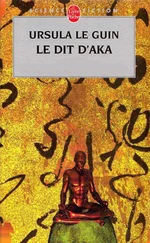This did not quite satisfy the homescreen audience, or the maverick scientists who had questioned the theory of asom-nism, or even the government which was supporting Dr. Mr. Prof. Uy Tug’s program in hopes of a generation of geniuses who would bring Nuum to its knees and confirm Hy Brisal as the supermost superpower in the world. After a good deal of time and pressure and committee meetings, a Committee of Scientific Investigation charged with making a disinterested report was forced upon the fiercely resistant Dr. Mr. Prof. Uy Tug and his staff.
The investigators found many of the parents of the Super-smarts pathetically eager to talk to them, begging for advice, help, treatment for their children. One after another, these loving and desperate mothers and fathers said the same words: “They’re sleepwalking.”
One young mother, uneducated but observant, set her little boy down in front of a mirror and told the investigator to watch him. “Mi Min,” she said to the child, “look, Mi Min, who’s that in the mirror? Who’s thai, honey? That little boy, what’s he doing?” But the child “did not relate in any way to the image,” as the investigator wrote. “He showed no interest in it. He never looked into the eyes of the mirror image. Later I noticed that though his glance sometimes crossed mine at random, he did not look into my eyes, nor could I look into his. I found this curiously disquieting.”
The same investigator was also disturbed by the fact that none of the children pointed at anything or followed the direction of a pointing finger. “Animals and young infants,” he wrote, “look at the finger rather than at the direction pointed at, and do not point themselves. Pointing as a meaningful and understood gesture is a normal spontaneous development occurring in an infant’s first year.”
The Supersmarts obeyed direct, simple orders, erratically. If told, “Go to the kitchen,” or “Sit down,” they often did so. If asked “Are you hungry?,” a child might or might not go to the kitchen or to the table to receive food. When hurt, none of the children would run to an adult crying about the “owie.” They just crouched down, whimpering or silent. A father said, “It’s like he doesn’t know it happened to him, like something happened but he doesn’t know it happened to him.” He added proudly, “He’s tough. A real soldier. Never asks for help.”
Spoken endearments seemed to mean nothing to the children, though if offered a physical embrace they might nuzzle or cuddle up to the speaker. Sometimes a child would say or hum endearments—”Nice nice nice,” “Mama soft, mama soft”—but not in response to loving words from the parent. They responded to their names, and most of them if asked their name would say it, though some did not. The parents reported that they increasingly seemed to “just talk to themselves” or “just don’t listen” and that their use of pronouns was often arbitrary—“you” for “I,” or “me” for “them.” All their speech seemed to be increasingly spontaneous not responsive, random not purposive.
After over a year of patient and intensive study and discussion, the investigators published their report. Its language was very cautious. They put a good deal of emphasis on the case of Ra Gna, who had continued to sleep up to an hour a night and even occasionally to doze off in the daytime, and was thus considered, in terms of the experiment, a failure. Ra Gna’s difference from the other Supersmarts was vividly and unguardedly described by one of the investigators to a homescreen reporter: “She’s a sweet kid, dreamy. They’re all dreamy. She wanders off, I mean her mind does; talking to her is kind of like talking to the dog, you know? She sort of listens, but most of it’s just noise to her. But sometimes she sort of shivers like somebody waking up, and then she’s there, and she knows it. None of the other kids ever do. They aren’t there. They aren’t anywhere.”
The conclusion of the investigators was that “permanent wakefulness appears to prevent the brain from achieving full consciousness.”
The media screamed with gusto for a month about Zombie Tots—the Waking Brain-Dead—Programmed Autism—Infant Sacrifice on Altar of Science—”Why Won’t They Let Me Sleep, Mommy?”—and then lost interest.
The government’s interest was kept alive for twelve more years by the unflagging persuasion of Dr. Mr. Prof. Uy Tug, who had firm allies in one of the Supreme Pinnacular’s most valued advisers and several influential generals of the army. Then, abruptly and without public notice, funding for the project was withdrawn.
Many of the supervising scientists had left the compound already. Dr. Mr. Prof. Uy Tug suffered a heart attack and died. The distraught parents of the Supersmarts—who had been forced to stay in the compound all these years, well fed and clothed of course and with access to all modern conveniences except communicative devices—got out and yelled for help.
Their children were now fifteen to seventeen years old and entirely sleepless. With puberty, they had fully entered into the state some observers described as altered consciousness, others as waking unconsciousness, and others as sleepwalking. The last word was particularly inappropriate. They were anything but asleep. Nor were they oblivious to their surroundings, as is the sleepwalker who wanders out into traffic or tries to scrub the damn’d spot from her hands. They were physically aware at all times. They were never not aware.
Bodily they were healthy. Because they were fed well and regularly, with food always available, they had no hunting or foraging skills. They walked about, ran aimlessly, sometimes swinging on the playsets furnished them or from tree branches in the park, scratching the dirt into pits and heaps and wrestling with one another. As they matured, these puppy fights had begun to lead to sex play and soon to copulation.
Two mothers and a father had committed suicide during the long captivity, and a father had died of a stroke. The forty remaining parents had kept up a round-the-clock watch for years, trying to restrain their children: twelve adolescent girls and ten adolescent boys, all awake all the time. The conditions of the experiment prevented the parents from locking any doors; they could not keep the young people from access to one another. The parents’ pleas for locks and contraceptives had been rejected by Dr. Mr. Prof. Uy Tug, who was convinced that the second generation of asomnics would fully vindicate his theory, as expounded in the unpublished manuscript ofAsom-nia: The Answer Is to Come.
When the compound was opened, four of the girls had had babies, which were being looked after by the grandparents. Three more of the girls were pregnant. One of the mothers had been raped by one of the asomnic boys and was also pregnant. She was permitted to abort the fetus.
There followed an obscure and shameful period in which the goverment disclaimed any responsibility for the experiment and left its subjects to fend for themselves. Some of the Super-smarts were exploited sexually and for pornographic purposes. One was killed by his mother, allegedly in self-defense; she served a brief term in prison. At last, under the rule of the new Forty-Fourth Supreme Pinnacular, all the surviving asomnics, including their infants, were taken to a reservation on a remote island in the vast Ru Mu River delta, where their descendants have remained ever since, wards of the nation of Hy Brisal.
The second generation failed to vindicate Uy Tug’s theory but proved the skill of the genetic engineers: they bred absolutely true. No descendant of the Supersmarts has been capable of sleep after the age of five.
There are now about fifty-five asomnics on Wake Island. The climate is very warm, and they go naked. Fruit, cheese, bread, and other foods that need no preparation are left on the shore by an army jetboat every second day. Except for these provisions, tossed ashore from the boat, a strict no-contact policy is maintained. No humanitarian or medical aid is permitted. Tourists, including those from other planes, are allowed on a neighboring islet, where they can catch glimpses of the asomnics from a blind through high-power telescopes. Teams of scientific observers are occasionally lowered from helicopters into two observation towers on the island itself. These towers, inaccessible to the asomnics, are equipped with infrared and other highly sophisticated viewing devices; the observers are hidden behind one-way glass. Pickets from the Save the Asomnic Babies Association are permitted to march and keep vigils on the south shore. From time to time these SABA activists make rescue attempts by boat, but the army jetboats and helicopters have always forestalled them.
Читать дальше









